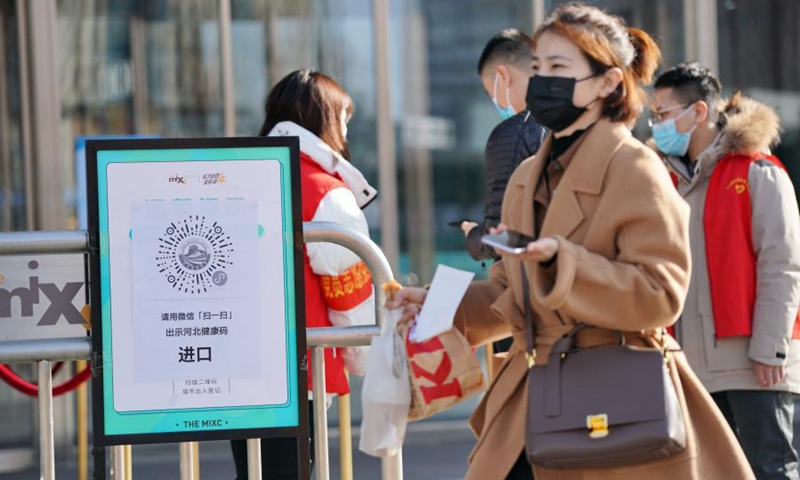
Customers are seen at a shopping mall in Qiaoxi District of Shijiazhuang, north China's Hebei Province, Feb. 5, 2021. Many commercial complexes and shopping malls in Shijiazhuang resumed operation in an orderly manner on Friday.Photo:Xinhua
The local government of Shijiazhuang, the provincial capital of China's Hebei Province that borders Beijing, said on Monday that the city will not require mandatory nucleic acid testing for all, but only for priority populations and key groups. Designed in accordance with the recently released 20 measures to optimize COVID-19 response, local officials stressed that such change is the further optimization and adjustment of epidemic prevention and control measures, rather than so-called full relaxation.
The announcement came after some local residents said on social media platforms that some public places in Shijiazhuang have stopped checking nucleic acid certificates, asking whether it is a sign of “full relaxation” or “lying flat” in the fight against the epidemic as the province still saw five new COVID-19 cases, including three in Shijiazhuang, and 684 asymptomatic infections, including 541 in Shijiazhuang, on Sunday.
On Monday morning, Zhang Chaochao, the city’s Party Chief, visited Hebei Normal University to check the epidemic prevention and control work. Zhang said that the further optimization and adjustment of epidemic prevention and control measures is a concrete action to implement the recently released 20 measures to optimize COVID-19 response.
It is by no means “lying flat” or ignoring the situation, nor is it the so-called full relaxation. It is to further make the prevention and control work more scientific and accurate, resolutely control those that should be controlled, and let go of those that should be, and preventing one-size-fits-all approach, Zhang said.
On Sunday, local government issued an open letter, saying to the public that optimizing and adjusting the prevention and control measures is not to relax the prevention and control measures, let alone “lying flat.”
The city government firmly adheres to putting the people and life in the first place, unswervingly implement the general strategy of “preventing import from outside and preventing rebound from inside” and resolutely preventing simplification and one-size-fits-all approach, the letter said.
Designated high-risk areas will be managed in strict accordance with the relevant regulations of the state. In addition, regular epidemic prevention and control will be carried out to maintain the normal order of production and life, it noted.
The city government will also strengthen the protection of the elderly, children, patients with underlying diseases and other vulnerable groups, and fully meet residents’ basic needs for medical treatment, heating and taking classes.
Local governments have also set up direct hotlines to respond to residents’ concerns and address doubts in a timely manner, making strategies more precise, measures more effective, and more satisfying and affordable to the public, sparing no effort to ensure people’s safety and health.
A mother surnamed Ling from Shijiazhuang told the Global Times on Monday that the company where she works still requires negative nucleic acid result in 72 hours to access the building, and the kindergarten where her child is enrolled still requires valid nucleic acid testing information.
According to Dingduan News, Shijiazhuang public transportation and subway officials said 72-hour negative nucleic acid tests are still required for people to take buses and subways in the city.
People from low-risk areas and other places returning to Shijiazhuang still need to obtain 48-hour negative nucleic acid test and can return home after reporting to local community in advance. Those who want to leave the city are also required to have a 48-hour negative nucleic acid testing report.
The Chinese central government on Friday released a circular detailing the further optimization of its COVID-19 response, announcing 20 prevention and control measures. The new measures included areas not affected by the epidemic, required that nucleic acid testing shall be carried out for high-risk positions and key population, and the scope of nucleic acid testing shall not be expanded. What’s more, local authorities should formulate specific implementation measures for standardizing nucleic acid testing, reiterate and refine relevant requirements, and correct unscientific practices such as “two tests a day” or “three tests a day.”
According to incomplete statistics collected from China Business Network, as of Monday, Zhenping county in Northwest China's Shaanxi Province, Fuzhou in East China's Fujian Province, Guangchang county in East China's Jiangxi Province, Yanji in Northeast China's Liaoning Province, Hefei in East China's Anhui Province and
Shanghai have actively adjusted their epidemic prevention policies and announced the cancellation or temporary suspension of mass nucleic acid testing.




